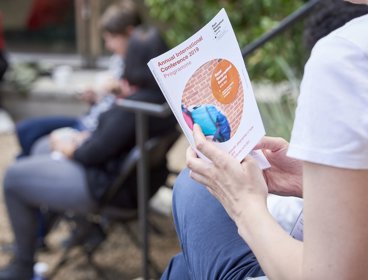This resource contains top tips for doctoral students preparing for their Viva. It was originally written by Priya Vadi for the RGS-IBG's Postgraduate Forum.
The viva is not as daunting as it seems. I really enjoyed mine and did not even realise that I had been in the room for just over 2 hours. Nobody will spend as much time reading your work in as much depth as your examiners. It is a real opportunity to show what you know and engage in a conversation with specialists in your field.
I was fortunate to have a fantastic supervisor who guided me through what the viva process entails and I would now like to share my top tips with you.
Top ten tips
-
Read your thesis 1 month before the viva and make notes on post-its rather than on the thesis itself as it will allow you to access what you require quickly.
-
I found useful to make notes of any errors on a separate piece of paper as well as in the thesis itself. Doing this allowed me to show my examiners that I was aware that the thesis needed a good proof read.
-
Read key articles and books to become familiar with what your examiners have written. Questions will usually be based on the work that they engage with.
-
Identify and acknowledge key gaps, weaknesses and mistakes. It will show that you are able to take criticism and are able to be critical of your own work
-
Make sure you know your own arguments and those of key scholars in your field.
-
Know what makes your work original and what contributions it makes.
-
You don’t know what questions will be asked. However, some questions you will be able predict, so know your answers to those and make short notes.
-
Take a note book and pen. This will allow you to write down questions and also buy you a little time in answering.
-
Having said that, take your time in answering the question and ask to repeat questions if needed (at one point my mind went blank and I did forget what the question was!).
-
It is about developing a narrative. It is a conversation with a purpose. I felt that I answered some questions inadequately, and went back to them, showing that I was able to develop my argument.
-
This is perhaps the most important of all; don’t be a nervous wreck! I did some yoga and meditation before I went in as it cleared my mind. Do what you need to do to relax!
Useful phrases
Here some useful phrases that may be helpful:
-
Can you rephrase the question?/ Is that what you are asking?
-
I am aware… however…
-
That’s an interesting point, but the way I was thinking about it was…
-
Is that answering your question?
Post viva
You will most probably be exhausted afterwards and may experience some anxiety a few days later. It feels very anticlimactic, as you have spent 3-4 years of your life working on one thing and now don’t know what to do. This is completely normal. It may take you a few days to adjust, enjoy your free time because hard work is now over!




